
Welcome, Gorehounds and Blood Babes all, to DIRECTION DISSECTION! A brand new series brought to you by the lovely liches at Dread Central, where I reach out to the directors of your favorite cult flicks, and converse about several films from their fearsome filmographies. These discussions will range from initial conceptions to behind-the-scenes tidbits, and everything in between.
“Never meet your heroes. They’ll surely disappoint.”
That’s what they say, right? It’s something I’m sure is true as often as not, but I believe such encounters should be evaluated on a case-by-case basis. That belief has only been validated upon meeting a personal hero of mine—someone who not only directed my all-time favorite film, but whose work ignited my love for cinema and horror from a dim spark to a blazing inferno. I’d say it’s been a dream come true, but my dreams have never been this cool. It’s a reality I’m currently living in and my brain is catching up to comprehend.
It’s an absolute honor to have the one and only Adam Simon as my first guest in this hopefully long journey across the horrorsphere. Simon is known for his hit series, Salem, but to me, he’ll always be the man who helmed the dino horror masterpiece, Carnosaur, the film that lives rent-free in my head, and the first cinematic love to grace my heart.
Let me stop before I get ahead of myself because we have two other movies to explore before we hike that dinosaur highway. First of which is his feature debut, which blurs the line between reality and “Reality” for a neuroscientist whose experiments with the human brain might be a little more hands-on than he thinks: Brain Dead!
In the film:
“Rex Martin (Bill Pullman) studies the preserved brains of paranoids and schizophrenics looking for deformities that might be corrected with brain surgery. This world-renowned brain surgeon is about to test his controversial lab research in the real world… The patient is Dr. Halsey (Bud Cort), a brilliant physicist, who after brutally murdering his wife and children suffers from acute paranoia. Dr. Halsey, now under observation at Lakeside Mental Hospital, is unable to divulge a mathematical formula that the managers of Eunice Corporation, his employers, want desperately. But is it just the doctor who requires surgery?”
Due to the length of the interview, this article will consist of only a few excerpts. However, you can read the interview’s entire transcript on my blog RIGHT HERE!
I highly recommend checking it out. You’re bound to learn something you didn’t know about the flick.
With that said, let’s crack this skull open and see what makes Brain Dead tick.
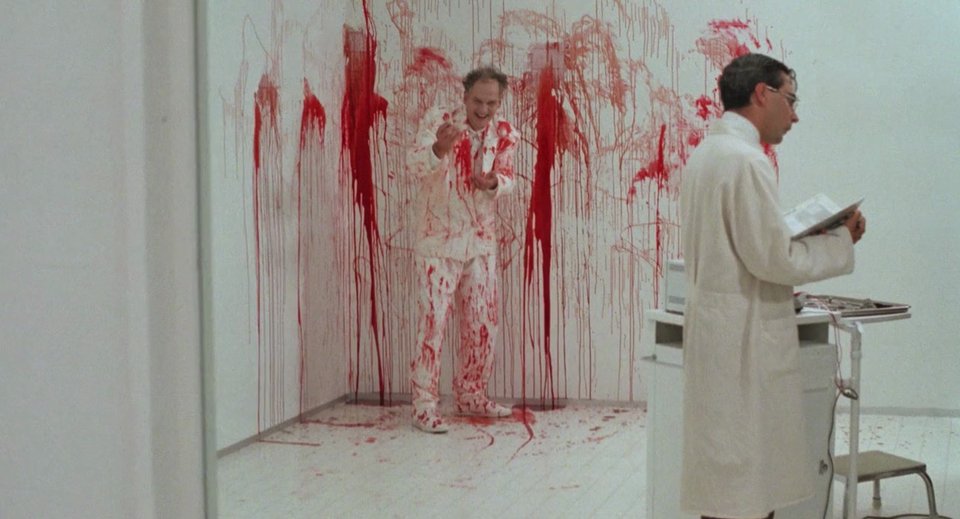
Dread Central: Alright, so here we go. Adam Simon! Pleasure having you here. It’s again MINDBLOWING. I really appreciate you taking the time to talk to me about all this and being my first video interview ever.
Adam Simon: I’m thrilled! I’m honored to get to be that.
DC: [Brain Dead] is your feature film debut! I can only imagine the excitement you had for your first big movie. I know the slim basics of this film’s background—Julie Corman had interns shuffle through scripts, this one was found and updated, it was shot in twenty days. But could you elaborate more on how the flick came to be? How did you personally come across it? How much creative control did you have over the production?
AS: Well yes, in the end, in part due to [Roger] Corman’s methods, and in part to Julie [Corman] producing, and she always produced the slightly more artistic, quirky, pretentious even—the artier versions of the Corman stable.
So… [I’m] coming home one day to my apartment… And there was an envelope sitting in front of my door, and it had the Concorde-New Horizons insignia… I opened it up, and it had this really fat script… I look at the title, and the title says Paranoia. I’m like, That’s interesting. And it says “by Charles Beaumont“.
At which point, my head sort of explodes, because he’s literally one of the writers I most worshiped growing up, with so many Twilight Zone [episodes], so many great horror stories, so many great screenplays. Amazing guy!
And there’s this little cover letter from Julie Corman saying, “Hey, we’d be interested in talking to you about maybe directing this…” I’m looking at it and going, Wow, that’s cool! And I’m also thinking, Wait a second… Charles Beaumont? I’m 99.9% sure he’s dead and has been dead for a long time.
And it’s true, he had actually died not long after writing that script in the early mid-69z9z. But he had written it for Roger [Corman] to direct, and I read it, and it was fascinating… So I met [the Cormans], talked to them… And then at that point, he [Corman] basically wanted to know, “What kind of things would you want to do to it?” And I outlined a handful of things…
Beaumont’s script is all about… the Freudian psychological sense of the mind. And so the relation between a Freudian psychiatrist and his patient who do, as in my film, end up swapping bodies or losing identities to each other, but it had nothing to do with the brain… So I just immediately said to Roger that’s what I wanted to do. I wanted to take this out of the realm of psychology and put it into neuroscience, and make it about the brain.
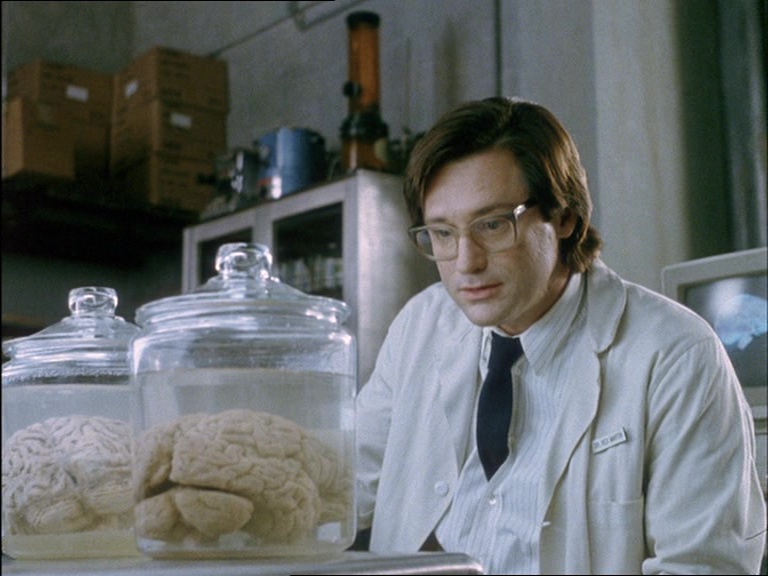
DC: There’s a lot of clues in the film about what’s really going on—Dr. Martin’s spiritual outlook on brains, the allusions to paranoia and experimentation, the unreliable perception of Martin’s reality, if reality is dependent on one’s own mentality. So my question is: is there a definite answer to what’s happening in the movie, or is it left completely up to interpretation?
AS: The answer is yes and no…I think that when it works, it’s because what I’m about to say is true, which is—I don’t think if you set out to create something completely indeterminate in its ultimate meaning, that it actually will work. The only person who can get away with that… is someone like David Lynch.
So I did map very carefully what I believed to be what’s actually happening [in Brain Dead]. I can tell you what I think that is, and I will, if you’d like.
DC: Oh, I would love it!
[Check out the FULL INTERVIEW to learn the “TRUE” canon!]
AS: But I’m struck by how many people—like yourself, like others who’ve seen the movie multiple times—present to me a completely different explanation for how it all works, and they can back it up and say, “You must have intended this because there’s evidence in the film!”
DC: So much like Martin’s reality, our reality in Brain Dead is what we make of it—based on us, and not so much there being an actual [canon]. There’s a way you say it is, there are people’s [interpretations], but as you said, it’s valid for everyone else’s logic to fit in there, too. Because there’s all those different “clues” and stuff like that. So it’s all dependent on the person.
AS: You can definitely go down the rabbit hole of how not just brain science, but physics—at its strangest and weirdest—says a lot of weird things about the universe and its relationship to the structure of the brain and other things.”
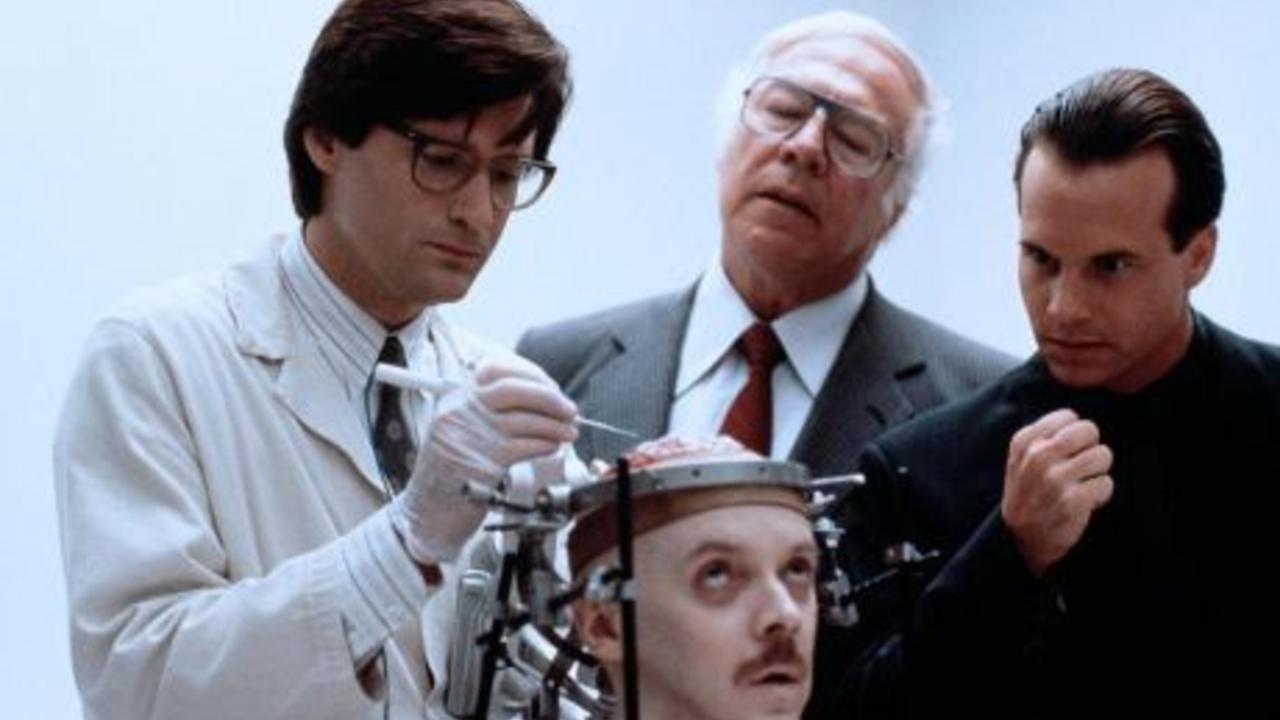
DC: So, of course, we have to talk about the brain surgery scene. It’s so well done! Was it hard to shoot? Was there anything you wanted to do that didn’t make it into the final cut? Or was that pretty much what you had in mind for the entire scene?
AS: Pretty much… that’s one of the only scenes that — and probably the wall of brains coming down — there’s only a handful of scenes that we storyboarded. And that one in particular I wanted to storyboard because I wanted it to be so clear and so specific.
In terms of the physical [prop] brains themselves, I think it’s probably enough decades ago that I can admit this probably illegal secret. So initially—and remember, I was young and dumb—I thought, Wouldn’t it be cool if we could get a real human brain? To give it some authenticity?
[Got you interested, didn’t I? Read more about this “brain case” in the full interview RIGHT HERE!]
AS: But the actual brain surgery effects [the Burman brothers] did were fantastic… we also did a trick that was inspired by stuff Ridley Scott did in Alien… where sometimes something looks even more real when you’re not seeing it directly, but on a screen within a screen… if you go back and watch [Brain Dead’s surgery scene], a lot of the most intense shots are from inside the boardroom where they have the monitors set up. Which is videoing the same thing. So I’d show it occasionally where [Dr. Martin] was doing [the surgery], but often showed it there [in the boardroom] because it made it feel even more real in a way.
DC: And it puts you in the shoes of the evil corporate people in there, and they’re seeing all this. What they’re thinking and stuff. That’s really cool! I didn’t even think about that!
AS: Exactly.
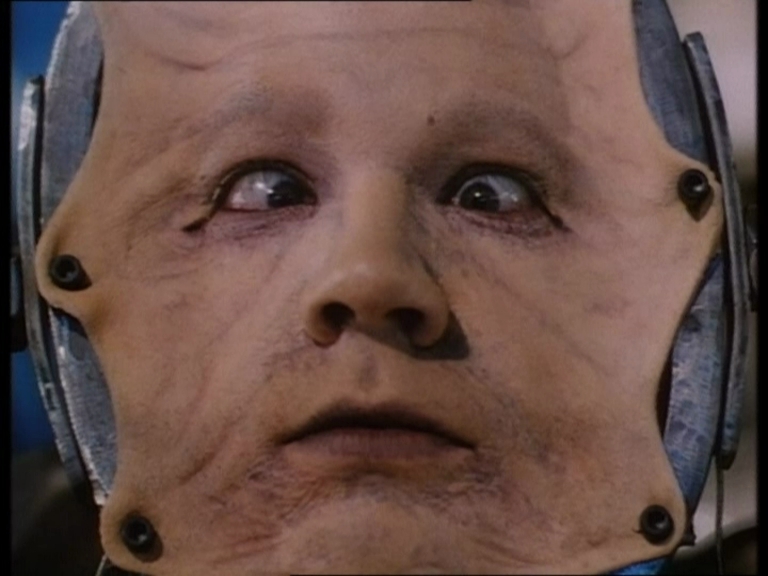
DC: Alright, here’s the one that’s more just for my personal curiosity. Despite being prominently featured on the poster, the “stretched-out-face-machine” only briefly appears in the actual film.
AS: Now, when I first saw them using that picture… I was really annoyed when they did that, because I felt it was giving the gag away. Because in the movie, when you see that face… It’s literally meant to be a disembodied face, only connected by nerves to a brain sitting behind it.
And yet, in that photo, you see the guy’s hands holding it. And I’m like you just gave — That was a backstage photo we took for fun. It gives the gag away. But they were like, “No, it’s scary! People love the photo!” So really, it’s taken me however long it’s been — thirty years, or whatever it is — to make my peace with that… so many people say that they originally rented the movie because they thought that was such a cool image, and they don’t seem to think what I thought when I saw it, which is like, But no, you’re giving away my gag! You’re showing behind the curtain! That it’s not real!
DC: So it’s a begrudging thing. Where you’re like, [resigned voice] I guess it works, dammit!
AS: [resigned voice] Yes, I guess it does.
DC: I mean… [it] got me to watch the movie.
AS: Exactly! I think they were right in the end. They’re notorious for that kind of stuff, like I said. But whatever it takes to sell the movie, that’s what they were going to do, you know?
DC: [sarcastically] I mean, I guess that’s like their job or something. I don’t know.
AS: That’s for sure.
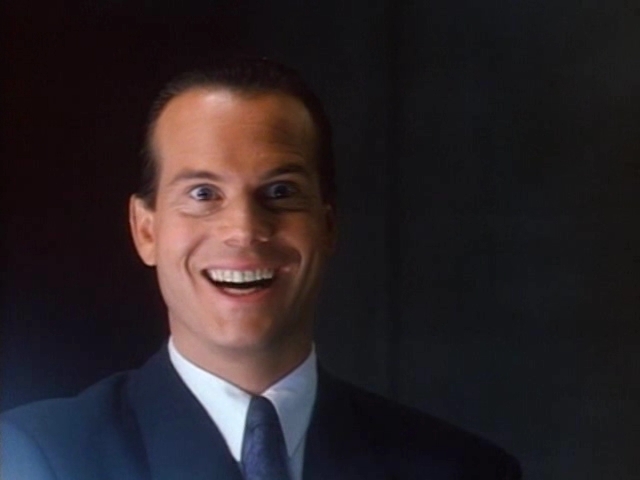
DC: Next one up — that ENDING THEME. We have to talk about it. It’s jammy as hell! Who came up with that song?
AS: So you know who gets credit for that?
DC: Who?
AS: Bill Paxton.
DC: Really!?
AS: Bill Paxton. Bill Paxton was friends with—and part of—a band at the time called Martini Ranch. And I got them — he suggested that they would do a song for the end of the movie. And Corman never had songs, and he said, “Well, I’m not going to pay for a song. I’ve already paid for the score. I’m not going to pay for the song.” So I said to the guys, “Well, we’d love to have you write an original song and use it, but we can’t pay anything for it.” And they said, “Well, tell you what, if you let us use footage from the film for the music video .”
There was actually a music video… So I went back to Roger [Corman] and said, “Look, we can have the song for free, and we just have to let them use some footage for free.” And he was like, “Okay, done.” They were LA guys trying to become a rock dance band, or whatever, and they wrote the theme from Brain Dead. [laughs]
DC: Honestly, I think they hit the top right there. They peaked! All downhill from there! [laughs]
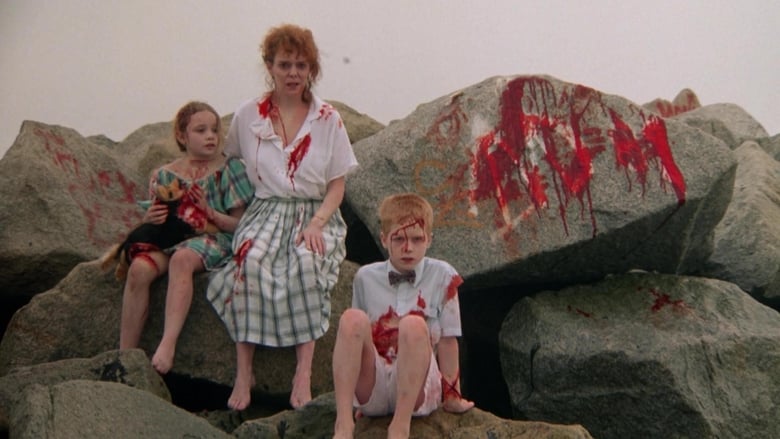
That’s just a taste of the 90-minute interview, where we discussed a myriad of other topics like:
- Simon’s start in film school.
- How he lost a film to Sylvester Stallone.
- How Tim Robbins was supposed to star in Brain Dead, and why he didn’t. [Hint: It involves Jacob’s Ladder]
- His experience working with Bill Pullman, Bill Paxton, and the rest of the cast.
- The inception of Simon’s own fictional evil company — the Eunice Corporation.
- What the hell is up with that misleading promotional blurb.
- The time Brain Dead ALMOST won the Deauville Film Festival’s jury prize.
- And an inspirational conversation with THE Sam Fuller that rekindled Simon’s love for filmmaking.
Check out the ENTIRE interview RIGHT HERE!
And don’t forget to drop by next time where Simon and I dive into his second feature film: the erotic thriller Body Chemistry II: The Voice of a Stranger! Don’t worry, the first one isn’t required viewing.
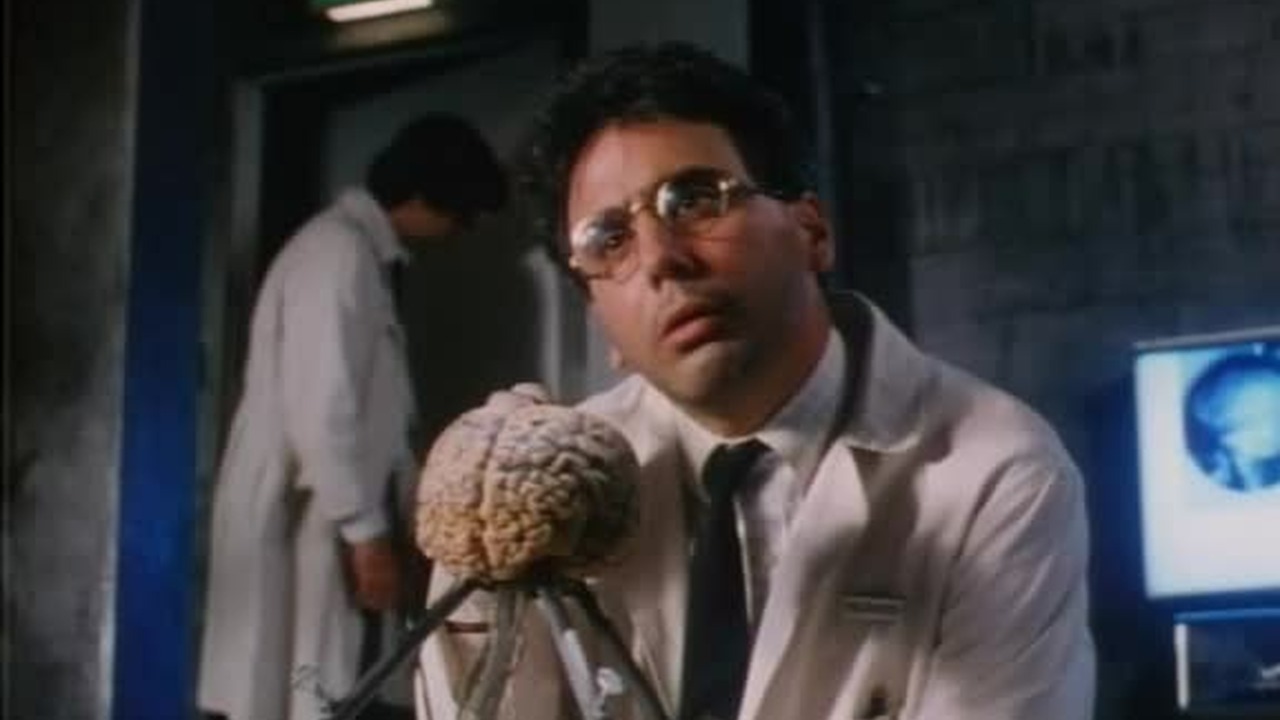
Categorized:Interviews
![Being ‘Brain Dead’ With Director Adam Simon [Direction Dissection] Being ‘Brain Dead’ With Director Adam Simon [Direction Dissection]](https://www.dreadcentral.com/wp-content/uploads/2024/10/Brain-Dead-14-e1728768872360.jpg)
